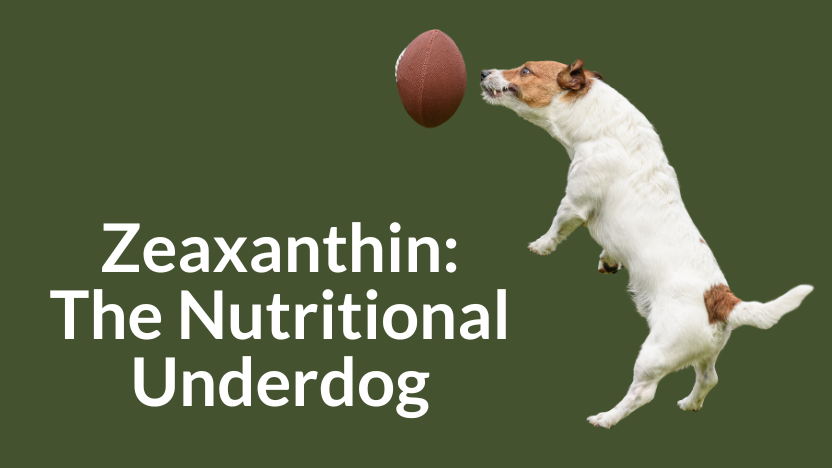Why Zeaxanthin Is the “Underdog” Ingredient
Posted by EyePromise on Oct 30th 2024
There are tons of nutritional supplements recommended for athletes of all disciplines. From protein to support muscle development to Vitamin D to support bone health, the list is lengthy. However, there’s one nutrient that most athletes aren’t getting, but they should be. It’s called dietary zeaxanthin (zee-uh-zan-thin), and it can be the difference maker in game-time situations.
React Faster.

Zeaxanthin has powerful antioxidant properties, which helps it make its way to the brain. In the brain, zeaxanthin finds itself supporting the neural pathways that transfer information, specifically visual information. When it finds itself here, it acts like a form of grease, increasing the ease and speed at which information travels known as visual processing speed. When visual processing speed increases, so does reaction time. Or rather, it decreases.
Simply put – zeaxanthin has been demonstrated to improve reaction time with consistent, high-level supplementation.
See Clearer.

You may have noticed we focused on the visual cues in the former paragraph. That’s because zeaxanthin is most heavily concentrated in a place deep in the retina called the fovea (fo-vee-uh). With the help of another powerful nutrient called dietary lutein (loo-teen), it functions like polarized sunglasses, reducing visual noise and enhancing details to make them easier to see.
Specifically, zeaxanthin and lutein have been shown to improve visual acuity and contrast sensitivity.
Less Sensitive to Light.

As mentioned, zeaxanthin is concentrated in the fovea, which is located right in front of the sensitive cells responsible for crisp clear vision. Here, its antioxidant properties also protect those cells from oxidation caused by harmful light, the same process that causes metal to rust.
With zeaxanthin and lutein working as “internal sunglasses,” they can help reduce sensitivity to light and glare recovery (the time it takes to “see normally” after exposure to bright light).
Protect Your Brain.

So, we’ve talked about the protective qualities of zeaxanthin for the eye, but it’s also found in the brain. Does it have protective functions there, too? The short answer: yes! While more research is needed, studies show that brains with cognitive dysfunctions are lacking zeaxanthin.
Furthermore, other research demonstrates that zeaxanthin helps improve:
- Focus
- Memory
- Decision making
Why Is It an Underdog?
With all these great benefits, why is dietary zeaxanthin sometimes looked at as an underdog? Most nutritional supplements focus on its counterpart: lutein. Early studies (AREDS, AREDS 2) matched the natural ratio of lutein to zeaxanthin found in the diet (5:1) vs. the natural ratio of zeaxanthin to lutein found in the fovea (2:1). Since these studies were seen as “the gold standard,” most other nutrition companies followed suit. However, dietary zeaxanthin is, has, and always will be the eye’s choice of antioxidant protection (if it receives adequate amounts via diet/supplementation).
Another reason zeaxanthin can be looked at as an “underdog” is because few athletes are including this powerful ingredient in their daily regimens. The benefits of supplements like protein, Vitamin D, and Omega-3s have been preached in almost every locker room. Zeaxanthin is rarely discussed in the locker room, in courses for dietitians, or even courses for eye doctors.
So, few realize the potential of dietary zeaxanthin in sports.

Dietary Zeaxanthin for Athletes
If you want to get started on a dietary zeaxanthin regimen of your own, EyePromise® provides high-quality, natural eye health performance supplements that deliver the levels of zeaxanthin to make a difference on and off the field/court/pitch/track/etc. Our performance products are NSF Certified for Sport, ensuring that each and every dose has everything athletes need and nothing they don’t (banned substances, heavy metals, etc.).
Learn more about the only performance eye health supplements with dietary zeaxanthin.


